Gover Buttars
10 December 1895 – 24 December 1966
Just twenty five days
before the Territory of Utah became the forty fifth state of the
Union, in a the little town of Clarkston, tucked away in a remote
corner of Cache Valley; Gover Buttars was born on December 10, 1895
to Daniel and Emma Gover Buttars in Clarkston, Utah. He was the sixth
of ten children.
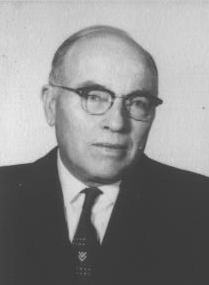
Clarkston had grown from a newly founded settlement only forty years earlier into a thriving community. Gover was a product of Mormon pioneer heritage. His grandparents joined the Church of Jesus Christ of Latter-day Saints in Scotland and England, immigrated to America, and crossed the plains with the pioneers. They were among the earliest settlers in Clarkston.
His older brothers and sisters were Daniel David (November 20, 1884), Margaret Sarah (August 25, 1886), Melvin Henry (December 23, 1888), Orson Morris (April 18, 1891), and Maybell (May 3, 1893). His younger brothers and sisters were Iraw (13 May 1898), Hattie Bethea (17 November 1900). Archulious (November 6, 1903), and Wallace Spaulding (July 25, 1906).
During Gover's childhood, he lived in the three room house was born in. He and his brothers slept
in the unfinished attic. To reach the attic, they had to use a ladder
attached to the outside of the house. Later a platform and stairs
were installed. Gover was baptized July 3, 1904, a few months after
he turned eight years old.
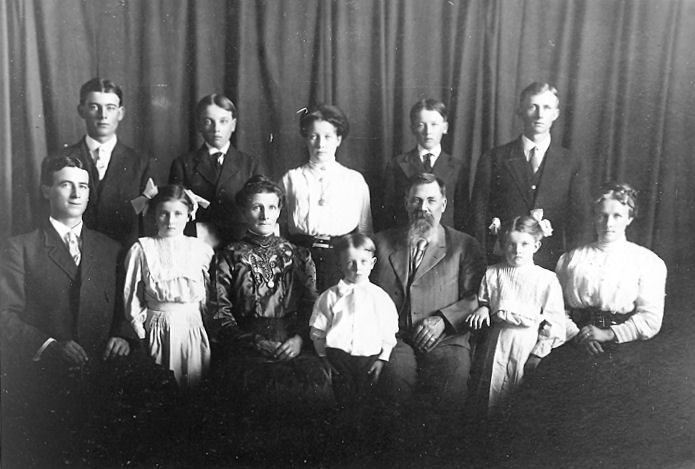
Daniel and Emma Buttars Family - about 1904
Standing; Orson, Danny,
Margaret,Melvin, and Maybell.
Seated: Gover, Emma holding Archulious, Daniel with Hattie, and Iraw.
In December 1907, when he was twelve years old, the family moved into a brand new large two story house complete with indoor plumbing and gas lighting. The kitchen, dinning room, parlor, and two bedrooms were on the main floor. A beautiful hand carved banister graced the stairs that led to five more bedrooms on the top floor. This house was on the same lot as the two room log house.
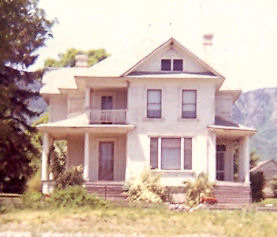 The Daniel Buttars home built in 1907 |
Gover grew up in
Clarkston and learned to appreciate hard work on his father’s dry
farm and caring for livestock. His father raised draft horses and
Gover gained a love for these magnificent animals that lasted
throughout his life. Gover became an expert teamster and could get a
team of horses to perform exactly as he wanted. Gover attended school
in Clarkston and graduated from the eight grade. His strength was
math and he also had excellent penmanship. One winter, his father
sent him to Utah State University in Logan where he took some
agriculture classes, and more importantly to care for some horses
that Daniel had there.
On November 23, 1915 he
married Mary Eliza Godfrey in Preston, Idaho. Mary was the daughter
of Joseph Maurice Godfrey (Gover's first cousin) and Mary Eliza
Barson. It was against the law in Utah for anyone so closely related
to marry so they went across the border into Idaho to get married.
At the time they were married, Gover was a couple of weeks short of
his twentieth birthday and Mary was seventeen. Just six weeks after
Gover and Mary were married, his father died suddenly of a heart
attack on January 10, 1916. Gover and Mary were sealed in the Logan
Temple on February 16, 1916. 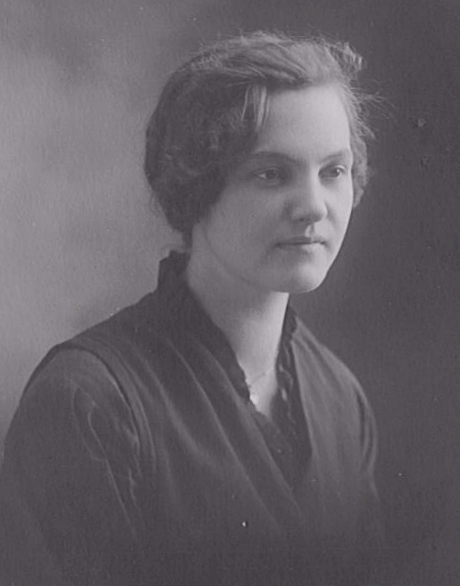
Mary Eliza Godfrey
Their first home was a two room frame house on the northeast side of Clarkston. Their first child, Ervin Daniel, was born October 8, 1916. Mary had said that she wanted to have ten children and was off to a good start. On July 1, 1918 their second son, Gordon Gover, was born.
The Great War, which later
became known as World War I, ended on November 11, 1918, but before
long the nation was faced with another crisis which affected Gover
and his family. As the soldiers came home from Europe, they brought
with them a deadly influenza virus. That fall, the terrible Asian Flu
epidemic swept the country. Gover, Mary, Ervin, and Gordon were all
flat in bed with terribly high fevers. Mary’s mother, Liza, took
care of the stricken little family. Liza soon became as sick as the
rest of them.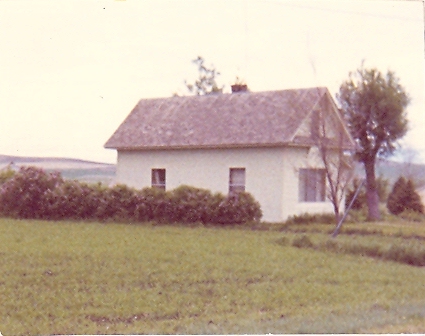
Gover and Mary's first home
Church and school was canceled from October 1918 until January 5, 1919 due to the flu. Mary’s cousin, LaRee Barson, was asked to help take care of the very sick family. Someone else called on them each morning to see what supplies were needed. LaRee did her best tending the baby and taking temperatures but soon became sick herself. Very few people in town escaped the epidemic, some even died. The funerals were held out in the open and everyone wore gauze masks. A few young men in town went from door to door doing the milking and other chores. Eventually Clarkston lived through the epidemic.
This family was off to a
happy start with their two little boys. Gover and Mary each had a
rocking chair in which they would rock their two little boys to sleep
each night. Milton Rudger was born September 25, 1920. Soon after
giving birth, Mary hemorrhaged and the bleeding could not be stopped.
With such a small family and a promising life ahead, Mary died that
same day. 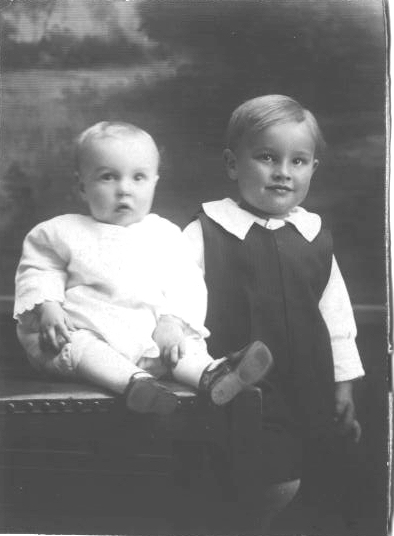
Gordon and Ervin about 1919
Left with two little boys and a baby to care for by himself, Gover moved his little family in with his mother and her two youngest children, Archulious and Wallace. There was plenty of room for them. Gover could take care of his farm and have his sons looked after.
One never does really get over the loss of a sweetheart, but with time Gover began courting Mary Harriet Bowles from Lewiston, Utah. Mary was the daughter of William Archie and Harriett Allen Bowles. She was twenty one years old and Gover was twenty six at the time they were married on June 28, 1922 in the Logan Temple. Ervin, Gordon, and Milton grew up calling her Aunt Mary. Gover and Mary moved back into his home along with Gordon and Ervin. Milton lived with Gover's mother for a few years. She raised him until he was eight years old.
In about 1924, Gover moved to
a new place a little ways west of town, down by City Creek. He had a
dry farm and raised purebred sheep and had a few milk cows. He
particularly loved to raise horses. His favorite team of draft horses
were Blanche and Bolly. Bolly was an extremely large horse. He wore a
size 24 collar; most horses wore a size 20. Another team was Vic and
June. He had other teams and saddle horses as well. One day Gover had
ridden Topps, his favorite saddle horse up to the dry farm to work.
Old Topps was tied to a fence when lightning struck up the fence line
a ways. The surge of electricity came down the fence and the jolt
sent Topps running for home, leaving Gover to get home on his own
power.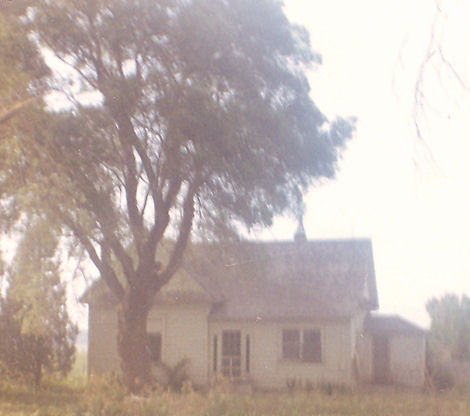
The house by the creek
He had a combine that
was pulled by six head of horses. It had an engine on it that ran the
machinery. The grain went into sacks rather than being handled bulk.
In 1923 or 1924 Gover bought the first car that he ever owned. It was
a brand new Model T Ford, named Molly. Having a car cut the twenty
mile trip to Logan down to only about an hour. 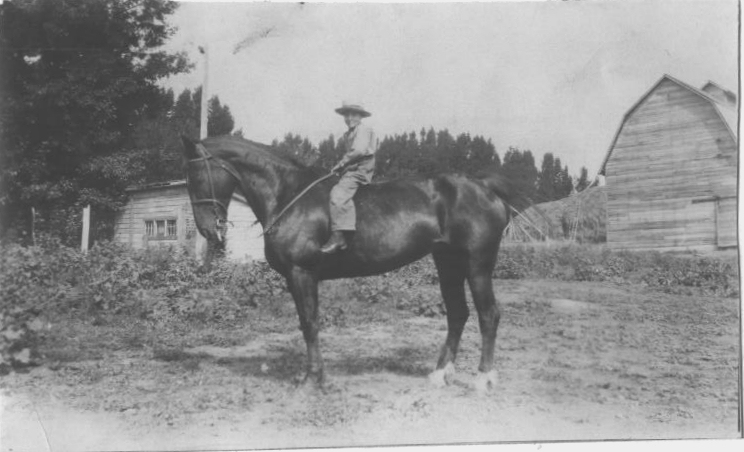
Old Topps (with Gordon on his back)
After waiting nearly six years to have her own children, Mary gave birth to Nolan on February 18, 1928. Such a long wait ended in sorrow as Gover’s fourth son was stillborn. Less than a year later, William Ralph was born on January 30, 1929.
In February 1929 the
family moved to Burley, Idaho. The farm was one mile south and a half
a mile east of town. A few years earlier, Gover’s brother, Iraw,
had moved to Burley as had his sister Hattie and her husband. That
winter the snow was so deep that he had to leave the car in
Clarkston. Gover’s cousin, John E. Buttars, who had moved to
Jerome, hauled their household belongings to Burley in his truck.
Gover, Mary, Gordon, and Ralph along with the horses, sheep, ten head
of milk cows, and all of his farm equipment came to Burley on the
train. Milton and Ervin were left behind in Clarkston with their
Grandmother Buttars because they had the chicken pox. In the spring
Gover went back to Clarkston to get Ervin and Milton, the car, and a
few things left behind.
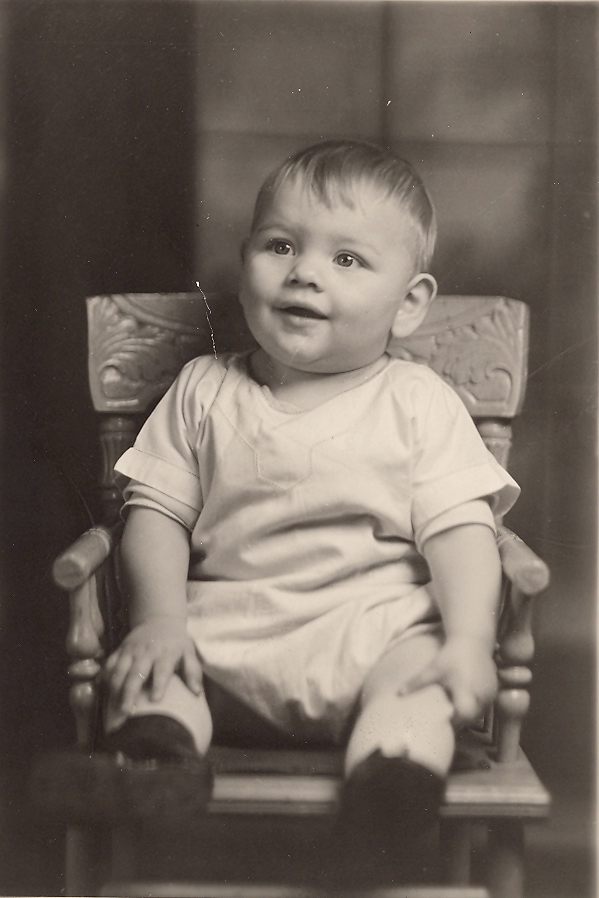
Ralph as a baby
Gover was a very reserved individual who was uncomfortable around strangers. He was a shy, sensitive, and conservative man who would avoid controversy at all cost. He was never one to get involved in anything outside of his own affairs. In Burley, everyone were strangers to him, where as in Clarkston he was surrounded by family and friends. For the most part, he had attended church regularly in Clarkston, but in Burley someone did or said something that offended him and he only attended on rare occasions after that. He had issues with tobacco and alcohol that didn't help matters either. He never paid his tithing, but he always contributed generously to fast offerings and other donations. Mary, on the other hand, was always an active and faithful Latter-day Saint all of her life.
On January 25, 1931 Gover’s
sixth son, Orvin Allen was born. The last of seven sons, Dean was
born April 19, 1934. Like his brother Nolan, Dean never took a breath
of this life. Both babies are buried in the Clarkston Cemetery. 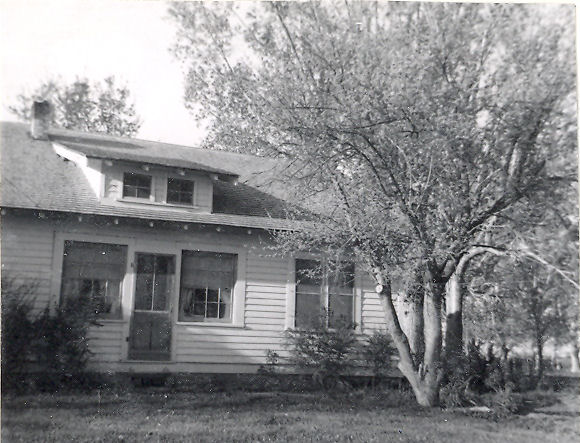
The house in Burley (taken in the 1940s)
Gover was an early riser. His routine was to get get up around four thirty or five o'clock every morning. He would have a cup of coffee and a cigarette while he planned out his day and reviewed his finances. Around six a.m. he would wake up the boys. The morning chores included milking the cows and feeding the animals. During the summer, there was water to change.
After the chores were done and the water was taken care of, they had a big breakfast before the boys went off to school. During the summer, they worked with him in the fields. At noon, they had dinner. Gover liked to take a thirty minute nap before going back to work. At six o'clock in the evening it was time to milk the cows and feed the animals again. Gover believed in the old adage, “Early to bed, early to rise, makes you healthy, wealth and wise.” He always retired early.
In his estimation, there was only one occupation and that was farming. He held a reverence for the soil. He lived and breathed farming. He loved to work and always managed to come up with things for his sons to do. Farming was not only his occupation, it was a way of living. He identified himself as a farmer; he thought as a farmer, he voted as a farmer; and raised his family as a farmer.
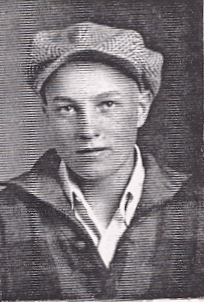
Gordon
October 29, 1929 was a date
that had an impact on the entire nation for the next decade. Gover
had only been in Burley less than a year when the Great Depression
began. During the Depression, Gover was able to keep his farm unlike
so many. They were better off than many others, but the price of farm
commodities was at rock bottom. At least the family had food to eat
from the large garden that Mary grew and meat from the livestock that
Gover raised. They had clothes to wear though they were old, worn,
and patched. And they had a place to live and the farm with plenty of
work. 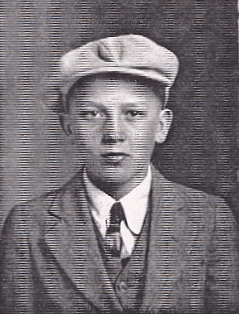
Milton
As the Depression trudged on through the 1930s, Franklin Delano Roosevelt became the President of the United States in 1933. In time, many of his programs did much to relieve the conditions brought about by the economic circumstances. Gover supported Roosevelt's farm policies and benefited from them. Because of this, Gover and Mary became strong Democrats and remained such for the rest of their lives.
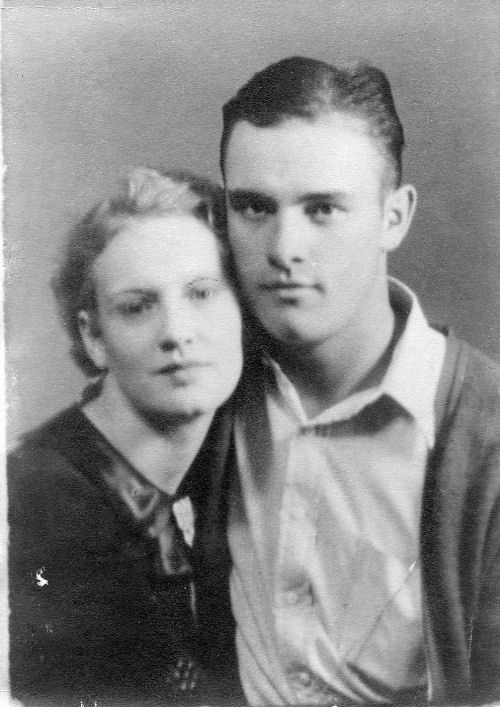
Ila nd Ervin
By this time the older boys
were beginning to grow up. In 1935 Gordon left home and went to Idaho
Falls to work. He was there about a year and a half before coming
home to help on the farm again. On May 28, 1936 Ervin married Illa
Hayden. Their son, Ervin Lynn was born on July 4, 1937. Gordon
married Lola Dayley on September 1, 1937 and their daughter Joyce
Thelma was born on September 18, 1938.
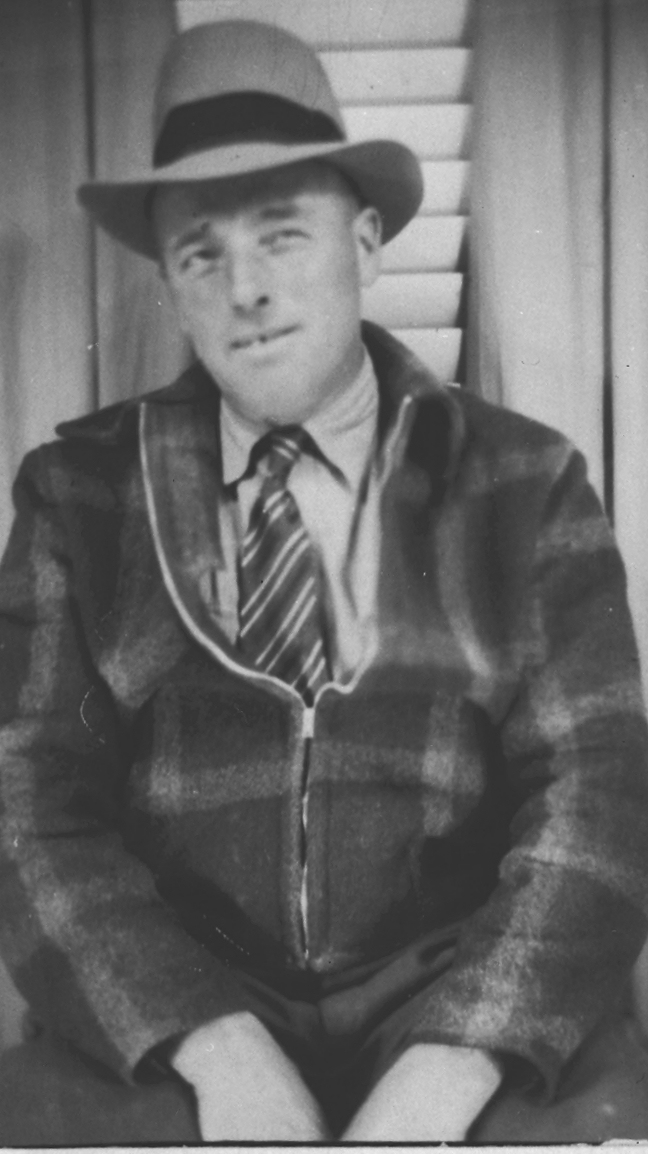
Gover in 1939 at age 44
In February 1938 Ervin and Milton were in a car/train accident. Milton was thrown free from the car unhurt. Ervin was badly mangled and lost both of his legs. Due to improper medical attention, gangrene set in and he died on February 6, 1938 leaving his wife with a six month old son.
Milton moved back to
Clarkston where he married Annabel Loosle on January 13, 1941. On
October 2, 1941, Annabel died during childbirth. The baby, which was
never given a name, also died. Gordon and Lola were divorced in July
1941 and he moved back home for a little while, before enlisting in
the Navy.
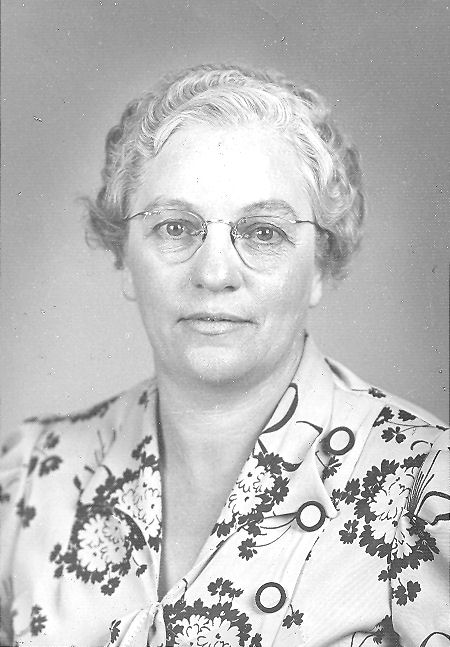
Mary during the 1940s
December 7, 1941 “A day that will live in infamy” struck very close to home for Gover’s family. Gordon had just completed boot camp and was at Pearl Harbor that fateful day. In the worried days that followed, Gover and Mary received a telegram from the Department of the Navy informing them that their son was listed as missing in action. Having lost his first wife, Nolan and Dean, and the recent death of Ervin, Gover was relieved when they received a second telegram stating that Gordon was alive and well following the attack.
Both Gordon and Milton
served in the United States Navy in the Pacific during World War II.
In 1943 Gover took Ralph and Orvin to Bremerton, Washington were
Gordon’s ship was undergoing repairs. From time to time Gordon and
Milton were able to come home on leave. 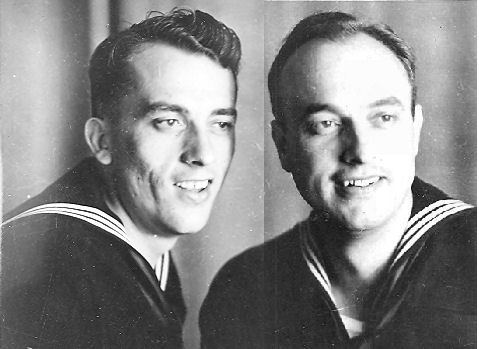
Milton and Gordon in the Navy - 1945
During the war, the home front provided two vital components to the war effort. One was industry, and the other was farming. So much of the nation's recourses were allocated to the war, that many commodities such as gasoline and sugar had to be rationed. To buy items that were rationed you had to present ration coupons in addition to the price of the goods. A good share of the crops that Gover raised went to feed the soldiers and sailors who were fighting in Europe or in the Pacific. Perhaps a potato from his farm would end up on Gordon or Milton's plate.
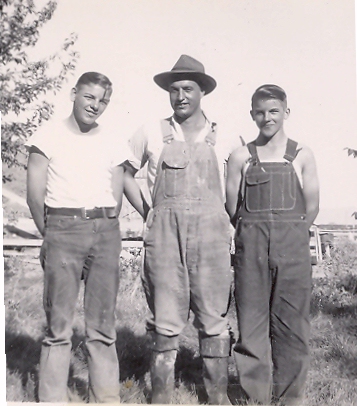
Ralph, Gordon (home on leave), and Orvin
- 1943
During those years, Ralph and
and Orvin were old enough to help on the farm. They got in on their
share of the chores and work. At that time, Gover had a hired man by
the name of Mr. Estep. In those days, before hay balers, hay was
stacked loose. It was cut and raked into windrows to dry for a few
days. To haul the hay out of the field, a team of horses pulled a
wagon between the windrows. Gover and Mr. Estep pithed the piles onto
the wagon while Ralph and Orvin loaded it. Mr. Estep always seemed to
cover them in hay. The leaves went down the necks of their shirts. At
close to a hundred degrees, the dry leaves, mixed with sweat was very
uncomfortable. One day, Ralph and Orvin decided that it was payback
time and pushed a whole corner of a load off the wagon, down on top
of Mr. Estep. The satisfaction was worth the wrath they caught from
their dad!
Gover never took much time
off from work on the farm and didn't do much with his sons, other
than work. One time he told Ralph and Orvin that he would take them
fishing with some friends to a stream above Oakley. On the way
through Oakley, Gover ran across an old drunken sheepherder and
invited him to come along. They ended up going to a different
location and ended up getting “skunked.” To make matters even
worse, the old sheepherder had an accident and wet his pants. It
ended up being a miserable day for one that began with such high
hopes. 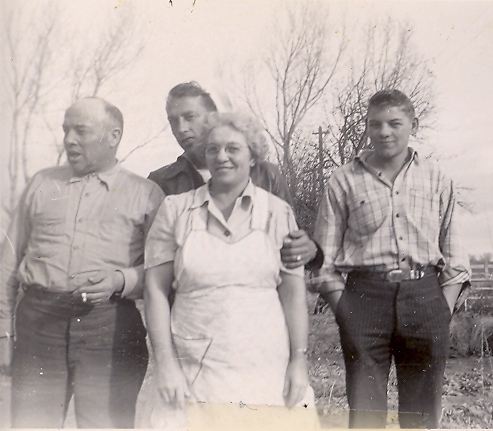
Gover, Milton (home on leave), Mary and
Ralph
With the depression and the war years behind them, there were a few good years left for Gover on the farm. Gover’s first tractor was a Farmall F-12. He would use it to plow but preferred to use his horses to work the ground. He didn’t like the wheel tracks that the tractor made in his fields. He always bought International Farmall tractors. He would only drive General Motors cars, usually Buicks. When television became available, he was one of the first to own one. Before they had a television, they had an old Philco radio. It was mounted in a large wooden cabinet with a domed top. It stood about three and a half feet high and took up a fair amount of floor space. Gover liked to listen to the news and read the newspaper.
Gover was almost completely
bald on the top of his head, but had a fringe of light brown hair
around the sides and the back of his head which later turned gray
when he got older. He was very sensitive about wise cracks about his
hair. He had partial a gold tooth. One time he had been working on a
piece machinery when the wrench he was using slipped off the nut and
hit him in the mouth, breaking off his tooth.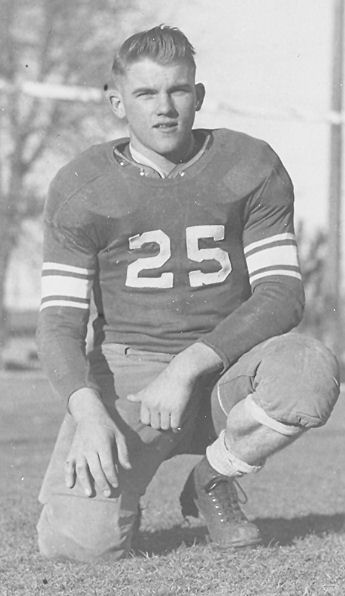
Orvin
He did not like to go to town to go shopping. He preferred that Mary would buy his cloths and bring them home for him to try on. He would however go to town to by a suit or a dress hat. Gover never felt he was properly dressed without a hat. When he did go someplace, he always dressed properly for the occasion.
Milton married Mildred
Lewis Delany, a widow with four daughters, on February 28, 1945.
Their son, Milton Reed was born July 9, 1946. By this time the
younger boys were growing up as well. On August 26, 1946 Ralph
married Arlene Stephenson. They were the parents of three children;
Linda Arlene (July 25, 1947), Richard Ralph (May 27, 1952), and Odell
Gover (October 21, 1954). Gordon married Carolyn Bowers on April 27,
1947. Orvin went to college and served in the Navy during the Korean
War.
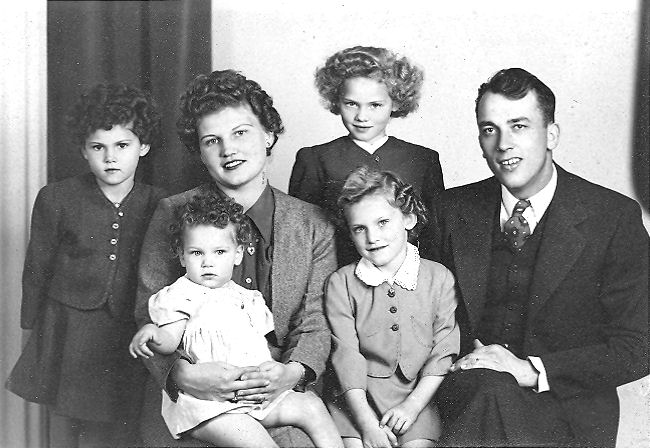
Milton and Mildred and the girls. Brenda (left)
Jamene (on Mildred's lap) Brenda (standing),
and Veronica (seated).
In 1948 Gover suffered a heart attack and had to retire from farming. Gordon finished his crop that year. After that the farm was rented out. Eventually Gover sold the farm but kept the home and outbuildings.
Gover was approximately five
feet eight inches tall and weighed around two hundred pounds. He was
light complected and because of continual exposure to the sun, later
in life he developed some skin cancer issues. He also had lip cancer
which was attributed to smoking. After the removal of the cancer, he
used a cigarette holder until he quit smoking.
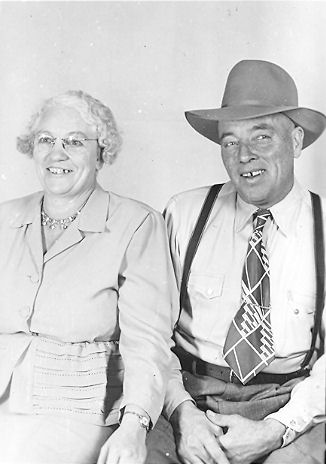
Gover and Mary during the 1950s
After his heart attack, the
doctor told him that that he would have to quit smoking and stop
drinking if he wanted to live. At that, he quit drinking. He placed
his bottle of gin in the cupboard. It just sat there for about two or
three years until one of his cousins came for a visit. Gover opened
the bottle and gave it to him. Going through withdrawal was hard on
him. He would be out in the field working with Orvin and Ralph and
have to leave and go back to the house. Mary would take him for a
ride or do something together until the craving passed. Later he was
able to quit smoking as well. It took a lot of courage for him to do
so.
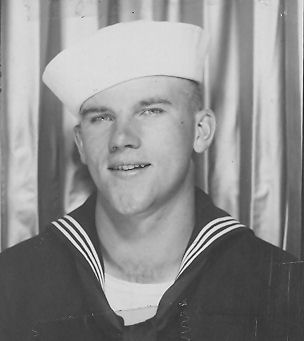
Orvin in the Navy
Gover's mother died on July 1, 1952 at the age of eighty seven. Prior to her death, three of his brothers had died; Daniel David in 1944, Iraw in 1949, and Orson Morris in 1951.
Orvin married Nadine Weedop
on September 8, 1954. They were the parents of six childrfen. Theresa
Ann (June 20, 1955), Sharla May (6 June 1956), La Prele (June 24,
1957), Nellisa (August 21, 1959), Gaylon Lyndell (March 26, 1964),
and Brian Evan (October 22, 1965). 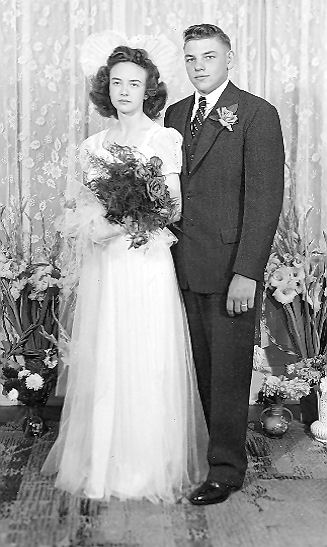
Ralph and Arlene
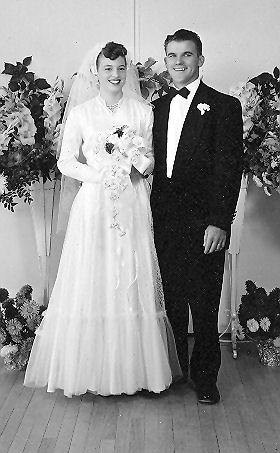
Orvin and Nadine 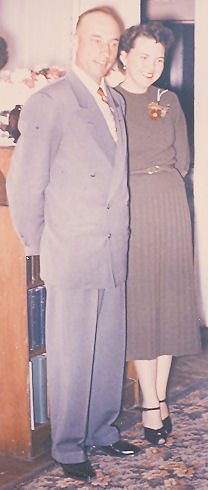
Gordon and Celia
Gordon and Carrie were divorced in 1952 and he married Celia Gean Frost on September 22, 1954. They were the parents of three children; Gordon Gene (June 19, 1955), Cindee (June 2, 1957), and Connie (September 29, 1961). Celia had two children from a previous marriage.
Rlaph and Arlene were divorced. Later he married Betty Lou Woodruff on March 16, 1965. Altogether, his five sons blessed him with seventeen grandchildren.
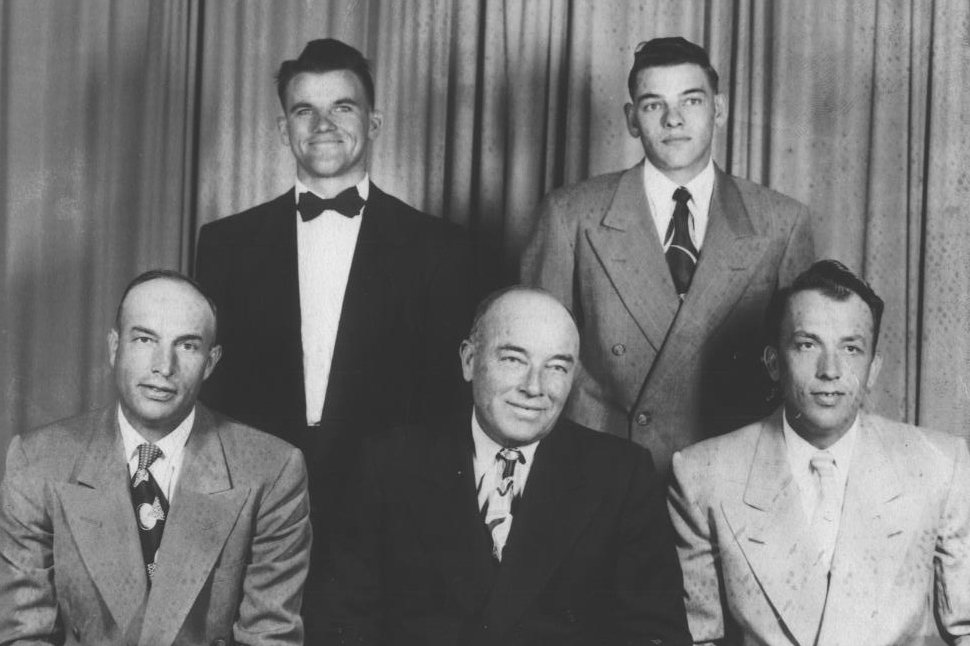
Gover and his sons in 1953. Seated: Gordon, Gover, and Milton. Standing: Orvin and Ralph
Gover had nicknames for
his sons. Gordon was John, Milton was Rugder (his middle name), he
called Ralph Peter, and Orvin was Andro.
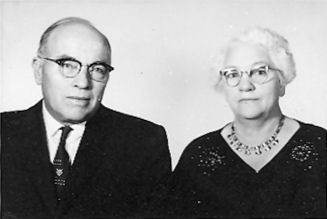
Gover and Mary in 1961
Over the years, especially during his later years, Gover went down to Clarkston to visit family or to attend the funerals of relatives. His younger brother Wallace died in 1957 and his older brother Melvin died in 1961. Nearly every year Gordon would take him and Mary down to Clarkston on Memorial day to decorate graves at the cemetery and to visit. Gordon also lived in Burley and was close by and always available to help them with whatever was needed.
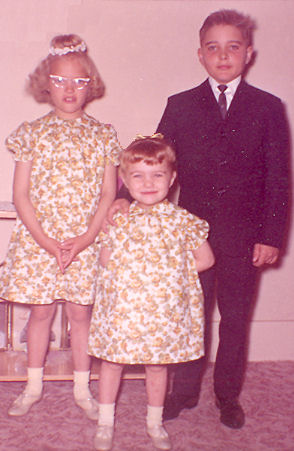 Gordon's children Cindee, Connie, and Gordon - 1965 | 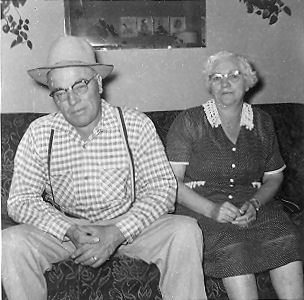 |
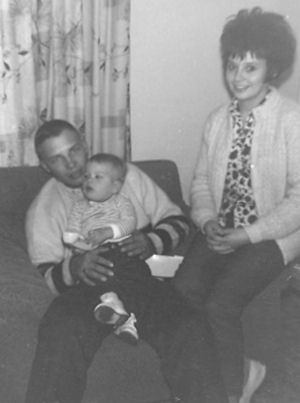 Milton's son Reed with Rod and his wife Donna - 1965 |
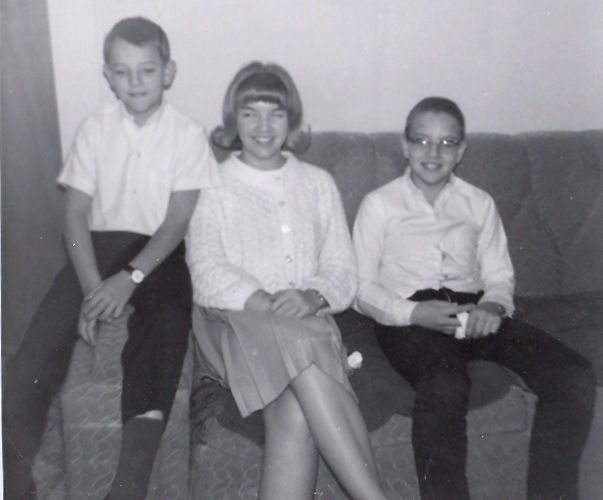 Ralph's children Linda, Dell, and Rick - 1965 | 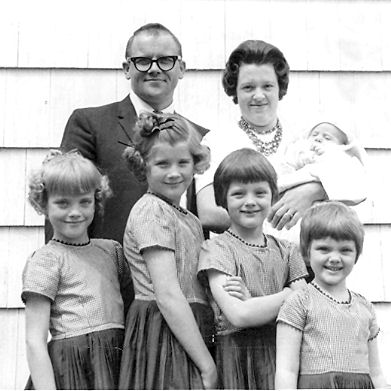 Orvin and Nadine and Famliy - 1964; Sharla, Theresa, LaPrele, Nelissa and Gaylon is the baby in Nadine's arms. (Brian hadn't been born yet.) |
The last few years of his
life, Gover had emphysema. During the last year or so he had an
oxygen tank next to his bed.
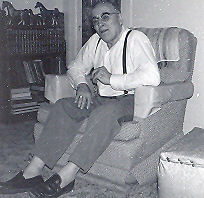
Gover in September 1966.
This is the last picture take
of him.
Gover Buttars died at the Cassia Memorial Hospital in Burley on December 24, 1966 at the age of 71. He was buried next to his first Mary in the Clarkston Cemetery. His second Mary died on April 20, 1971 and she is buried on the other side of him. The three share a common marker.
Gordon and Celia were divorced in 1968 and he married Birdena Wyman on April 11, 1969. Gordon died on January 19, 1983. Milton died on September 22, 1984
 |
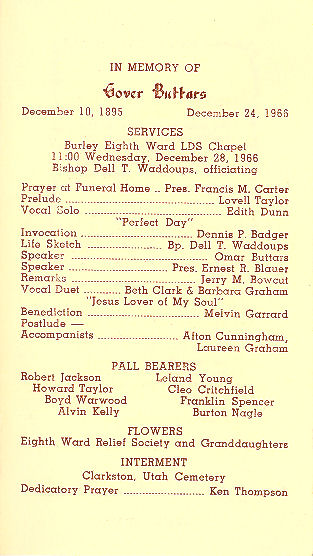
| 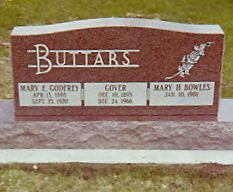 |